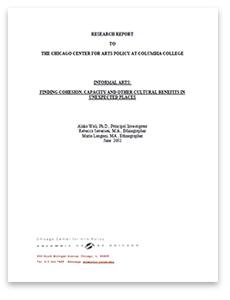
Author: Alaka Wali, Ph.D.; Rebecca Severson, M.A.; and Mario Longoni, M.A.
Publication Year:
Media Type: Report
Summary:
A team with the Chicago Center for Arts Policy found that the informal arts help to build both individual identify and group solidarity.
Abstract:
Over the last two years, a team of ethnographers from the Chicago Center for Arts Policy at Columbia College (CCAP) conducted a research study in the Chicago metropolitan region, investigating adult participation in the “informal arts” (sometimes called “unincorporated arts”). The informal arts encompass such diverse experiences as acting in community theater, singing in a church choir, writing poetry at the local library, or painting portraits in a home studio. These popular creative activities fall outside traditional non-profit and commercial arts experiences, and yet, according to a recent National Endowment for the Arts Survey of Public Participation in the Arts, engage millions of amateurs and professionals alike (NEA, 1997).
As the researchers discovered, these “hands-on” activities tap people’s creative potential and expand our concept of artistic participation beyond the role of audience member. Based on two years of ethnographic data collection, researchers concluded that the informal arts occupy a significant place in the social infrastructure of communities, helping to build both individual identity and group solidarity. [Introduction]
Arts & Intersections: Community Cohesion
Categories: Cultural Planning, Community Development
ADDITIONAL BIBLIOGRAPHICAL INFORMATION
Series Title:
Edition:
URL:
SBN/ISSN:
Pages: 438
Resources:
PUBLISHER INFORMATION
Name: Chicago Center for Arts Policy, Columbia College of Chicago
Website URL: http://artspolicy.colum.edu/publications.html